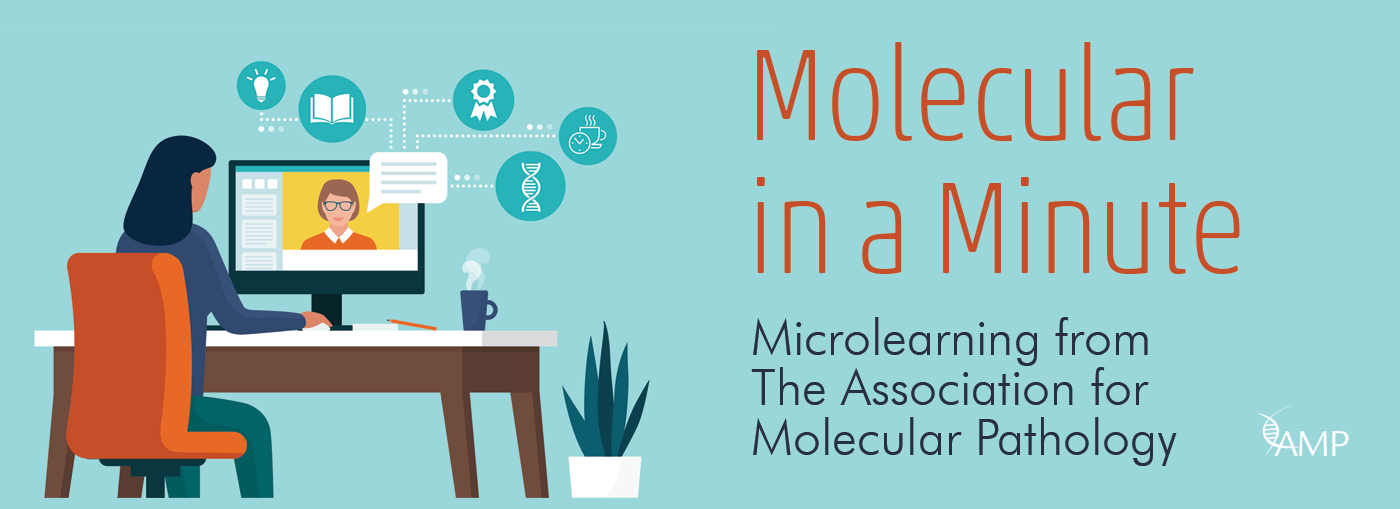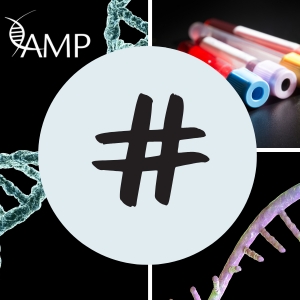Microlearning Modules

These bite-sized presentations are designed for a quick review, updates, and educational overviews by experts on a range of topics in molecular pathology. You can view these on your computer, tablet, or smart-phone to learn something new or to review material for an upcoming seminar, exam, meeting, or journal club.
The Molecular Pathology Competency Series
These microlearning modules are targeted to practicing laboratory professionals and cover many aspects of competency in the laboratory. They are short (10-15 minute) presentations covering Core (basic proficiency) or Advanced (specialized and/or recently updated) concepts in a particular area of laboratory training. This content addresses specific advances in training, technology, and laboratory operations and acts as review and/or updates in important principles for laboratorians over the full arc of their careers.
New videos
| Title and link to video | Speaker | Length |
| CORE: Testing Modalities for Structural Variants
At the end of this core concept module, learners will be able to recognize and differentiate some of the techniques by which gene fusions are detected. |
Adam Fisch, MD, PhD | 15 min |
| CORE: The role of RNA sequencing in interpreting splice variants
This core concept module will review how introns are spliced to create mature mRNA and describe how RNA sequencing is utilized in clinical laboratories to interpret potential splicing variants. |
Heather McLaughlin, PhD, FACMG | 22 min |
| CORE: Hybrid capture vs Amplicon based NGS
This core concept module will describe both amplicon- and hybrid capture-based targeting sequencing enrichment methods. Learners will be able to delineate the differences in technologies, as well as the advantages and disadvantages of each method, and in what clinical setting these techniques may be used. |
Marjorie David, MS, MD | 8 min |
| CORE: Identification of Mismatch Repair Deficiency by Next-Generation Sequencing
This core concept module will define mismatch repair deficiency, understand the strengths and weaknesses of using next-generation sequencing to detect mismatch repair deficiency as compared to traditional methods, and describe the clinical relevance of mismatch repair pathway testing. |
Jonathan Nowak, MD, PhD | 10 min |
| CORE: Measurement of Tumor Mutational Burden
This core concept module will define tumor mutational burden, understand why tumor mutational burden can differ widely between tumors, and describe the relevance of tumor mutational burden to immunotherapy. |
Jonathan Nowak, MD, PhD | 5 min |
Previous videos
| Title and Link | Speaker | Length |
| CORE: Biomarkers for Immunotherapy | Honey V. Reddi, PhD, FACMG | 14 min |
| ADVANCED: Biomarkers for Immunotherapy | Honey V. Reddi, PhD, FACMG | 12 min |
| CORE: Germline / Somatic Variants | Alanna Church, MD | 5 min |
| ADVANCED: Germline / Somatic Variants | Alanna Church, MD | 7 min |
| CORE: Lymphoid Clonality Testing | Nathan Montgomery, MD, PhD | 18 min |
| ADVANCED: Lymphoid Clonality Testing | Nathan Montgomery, MD, PhD | 18 min |
| CORE: Fluorescence in Situ Hybridization (FISH) | Lori Ramkissoon, MD | 13 min |
| CORE: Fusion Detection by NGS Using RNA | Alanna Church, MD | 5 min |
| CORE: Quantitative PCR | Lawrence Jennings, MD | 25 min |
| CORE: PCR and Sanger Sequencing | Va Lip | 19 min |
| ADVANCED: Detection of a Cryptic Gene Fusion in a B-ALL | Valentina Nardi, MD | 15 min |

Social Media Challenge
Submit your best molecular pathology tutorial for a chance to win free registration to AMP 2025 Annual Meeting and Expo in Boston!

















